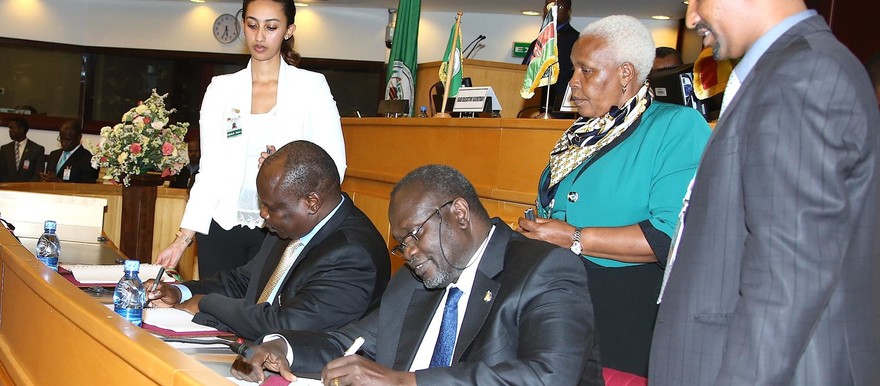The IGAD peacedeal only signed by opposition and the IGAD countries, provides powersharing in the entire country, including Greater Bahr al Ghazal and the Equatoria states, according to a copy of the deal pulished by IGAD.
The expansion of power sharing goes beyond the initial states of Upper Nile, Unity and Jonglei. In these states the government will have 46% shares, 40% to SPLA in Opposition and 14% to other political parties in all the states of South Sudan. In Bahr al Ghazal and the Equatoria states the government will have a secure majority of 80%, while SPLA/IO wil get 15 percent and other parties will get five percent. Each state government will have 15 ministers.
President Salva Kiir asked IGAD for a period of 15 days for ‘consultations’ before signing the peaceagreement, but Information Minister Michael Makuei expressed doubts whether the president will sign. Upon return to Juba from Addis Ababa he told the media: “We have already said no and we have come back to consult the people for the second time. If they say go and sign it, we will do so, but I doubt if people will say so.”
Concerning the presence of the army in the capital Juba, the signed proposal has deleted the word ‘demilitarization’, replacing it with ‘deployment of forces 25 kilometers radius outside Juba’. It is unclear what this will mean for the headquarters of the SPLA in Bilpam. The SPLA forces in Juba will be replaced by Joint Integrated Police whose size shall be decided by the Permanent Ceasefire and Transitional Security Arrangements Workshop.
A high-ranking SPLA officer expects that the agreement will divide the current army in vocal elements openly criticizing the deal and a majority accepting the deal silently. “The majority of our people will regard this agreement as a successful step forward. The ordinary people are saying this deal is better than no deal. I think this is because of the suffering they have gone through”. He doubted whether soldiers are motivated to continue the fight, considering the losses and the economic regression hitting the families.
Mounting international pressure
The US government spokesman John Kirby said it is regrettable that the South Sudanese government did not sign the agreement. He added that the US would work with regional and international partners on the next steps to increase pressure.
Photo Credit: Riek Machar and Pagan Amum during the signing ceremony, Kenyatta, 17 August 2015 (Kenyan Presidency)




